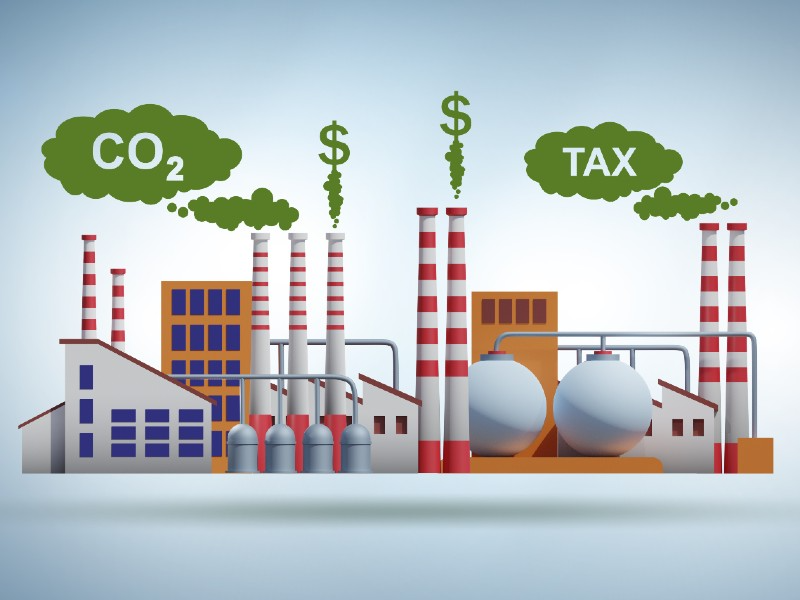Following the inauguration of Nigeria’s Climate Change Council (NCCC) by the former president, Muhammadu Buhari, in early February, the council announced its programme to include unveiling a carbon taxing policy and budgetary system for the country in accordance with the provisions of the Climate Change Act 2021.
The plan comes in furtherance to Nigeria’s commitment to the global emission reduction resolution. In June 2021, Nigeria pledged a 20 per cent reduction in greenhouse gas emissions by 2030. Also, at the 2022 COP26 held in Glasgow (Scotland), the former president announced a 2060 net-zero emissions target for the country
A further look into the newly introduced carbon tax however suggests that the policy has the potential to drive more investment into the less-talked about however needed environmentally friendly alternative energy sources.
Against the country’s growing economy, it is estimated that the country currently contributes no less than 137 million metric tons of carbon emission to the global production of carbon dioxide (CO2). This places the country amongst countries like South Africa, Egypt and Algeria who are the highest emitters in Africa, as well as among the top 30 world’s biggest emitters.
The Otherization of Nigerians by Nigerians
Connected Development submits Freedom of Information request on Nigeria Air scandal
Aside from the country’s population offshoot, the country’s economy is closely tied to oil and gas. No less than 95 per cent of corporations are currently running on traditional sources of energy majorly from fossil fuels. This is due to the epileptic conditions with the country’s electricity generation. The World Bank has in its 2020 report maintained that Nigeria is among the countries in Africa with extreme energy poverty.
Hence, with a growing population and a range of socioeconomic challenges, Nigeria requires sustainable energy sources to meet the growing needs of all sectors of its economy and achieve universal access to modern energy services.
A recent analysis of Nigeria’s energy potential found the country could meet 59 per cent of its energy consumption needs with renewable energies by 2050.
In January 2023, at the year’s Abu Dhabi sustainability week, the immediate past Minister of Science and Technology, Olorunnimbe Mamora, echoed the potential in the country’s energy plans. According to him, Nigeria can solve its energy demand due to its endowment with abundant renewable energy resources such as solar, wind, hydro, and biomass that can be harnessed to scale up its energy supply and achieve universal energy access, energy security and the reduction of greenhouse gas emissions for climate change mitigation.
The minister’s statement, as well as the African Development Bank’s calls for investment in alternative energy sources for mobility, seem to have opened minds and sights to these potentials. The evidence starts to manifest with the introduction of electric automobiles to the public transportation system in Lagos.
Driven by public-private arrangements, and piloted by the Oando Clean Energy Limited and Lagos state government, it shows the possibilities in renewable energy investment. Investment such as this will accelerate the actualisation of the country’s projection of zero-carbon emission by a significant reduction in the estimated pledged period and Co2 quantum.
Lagos State government has said the primary objective of the introduction of the electric transportation system is to reduce greenhouse gas emissions caused by the transportation sector, by developing a framework for infrastructure and investment to drive the implementation of sustainable transport.
Inter alia, implementing the carbon tax policy to fast-track the transition to this new renewable energy era may take a while to effectively translate to its overall purpose; and it has a tendency to bring about extra costs in service provision, and constant increases in prices of commodities.
However, with the revenues from the tax being reinvested into the sector through incentification of other lower-income industries that are running on low carbon technologies, it will earnestly boost the desired capacity in transitioning to the new energy source.
The arrangement of reinvestment of the carbon tax system proceeds into the sector will encourage corporations to re-think their energy sources and convert their operations to low-carbon technologies. This, in the long run, will further influence them to invest more in environmentally friendly energy options.
Establishing trust in the minds of high-carbon emitters and imperatively carrying along the electorate, as the majority are still sceptical as to the viability and reliability of the low-carbon options in their operations, will be another bottleneck. However, defusing these fears of the tax policy being a bad strategy that is dangerous to corporate business can be better achieved if and when reinvestment follows through.
Overall, the plan will set forth the country on the global alternative directions to getting accelerated transition and capability to meet the global demands for alternative energy demands.
Ridhwan wrote from Lagos

 Join Daily Trust WhatsApp Community For Quick Access To News and Happenings Around You.
Join Daily Trust WhatsApp Community For Quick Access To News and Happenings Around You.